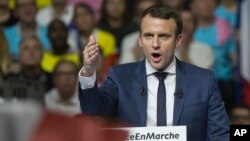The Kremlin denied on Tuesday that it was behind media and internet attacks on the campaign of French presidential frontrunner Emmanuel Macron though his camp renewed the charges against Russian media and a
hackers' group operating in Ukraine.
Kremlin spokesman Dmitry Peskov, replying to a question on a daily conference call, said charges made on Monday by Macron's party chief, Richard Ferrand, were absurd.
"We didn't have and do not have any intention of interfering in the internal affairs of other countries, or in their electoral processes in particular," Peskov told reporters. "That there is a hysterical anti-[President Vladimir] Putin campaign in certain countries abroad is an obvious fact."
Ferrand said on Monday that the French centrist politician, who is now seen by opinion polls as the favorite to win the election in May, had become a "fake news" target of Russian media and that his campaign was facing thousands of internet attacks.
Ferrand said Moscow looked favorably on the policies of far-right leader Marine Le Pen and center-right candidate Francois Fillon - both election rivals of Macron - and both had been "mysteriously spared" from Russian media criticism.
Macron's strong pro-Europe stance was not to Russia's liking however, he said.
Le Pen, who heads the National Front and is Macron's closest competitor in the race for the Elysee, wants to take France out of the European Union and supports Russian policy on Ukraine.
On Tuesday Ferrand renewed those charges saying that the databases and e-mail boxes of Macron's En Marche! (Onwards) party were under attack.
"If these attacks succeeded, the campaign of En Marche would become extremely difficult, if not impossible," Ferrand said in Le Monde online.
He said about half of these thousands of attacks came mainly from Ukraine and had been organized and coordinated by a "structured group" and not by lone hackers.
"We are in the presence of an orchestrated attempt by a foreign power to destabilize a presidential election candidate," Ferrand said and called on the French government again to take steps to prevent foreign meddling in the French election campaign.
He again pointed the finger at Russian state-controlled media RT (formerly Russia Today) and Sputnik, saying they were spreading "the most defamatory" rumors about Macron, including relating to his private life and the financing of his campaign.
Both RT and Sputnik have denied spreading “fake news” about Macron and say Ferrand's allegations are unfounded.
Sputnik, in a comment on Tuesday, said Ferrand's accusations were false and lacked any evidence, and represented an attempt at spinning public opinion.
"By citing various opinions expressed by people involved in the election campaign, Sputnik always covers events as they are," it said.





